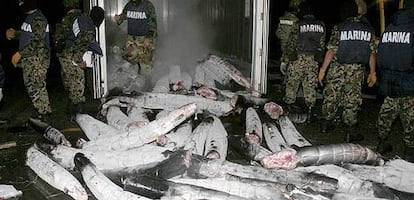Life sentence for Gerardo González Valencia, the narco who hid cocaine inside dead sharks
The drug lord was the leader of Los Cuinis, an ally of the Jalisco New Generation Cartel in Mexico

The news spread like wildfire across the globe. On June 16, 2009, drug-sniffing dogs handled by the Mexican Marines discovered something unsettling in a shipment of frozen sharks. The crew tried to brush it off, claiming that the dogs were smelling preservatives. But the Marines were suspicious, and when they decided to X-ray the sharks in a small town on the Yucatán Peninsula, they found a ton of cocaine inside the fish.
It was the early days of Mexico’s war on drugs and the stunning discovery faded over time only to resurface in 2020 when Gerardo González Valencia was extradited to the United States. Also known as Lalo or Silverio, González was the leader of the Los Cuinis criminal organization and the brother-in-law of Nemesio El Mencho Oseguera, the capo of the Jalisco New Generation Cartel (JNG). Once extradited, the 2009 shark incident evolved from a curious criminal anecdote into crucial evidence in the case against the drug lord in a Washington, D.C. court.
In mid-2021, González’s lawyers tried to exclude the evidence from the case, arguing that prosecutors aimed to sensationalize their client and tarnish his reputation. They also claimed that U.S. authorities were unable to establish the chain of custody after the cocaine seizure by the Mexican Marines, and that the confiscation itself was invalid since most of those involved were acquitted. “The prosecution aims to establish that the objective of presenting the evidence is to demonstrate the defendant’s involvement in the transportation of cocaine concealed within shark bodies, by means of testimony from cooperating witnesses,” countered the prosecution.

Much of this testimony hadn’t previously surfaced as González had already admitted to cocaine trafficking in late 2022. After months of delays, the drug lord was finally handed a life sentence in late July. “His sentence shows the commitment to hold cartels and criminals accountable to face justice,” said U.S. Ambassador to Mexico Ken Salazar this past Monday.
The United States pursued González for decades. Before the rise of the JNG, the Sinaloa Cartel’s current main rival, González had been arrested in March 1998 for distributing methamphetamine. He was convicted and sentenced to a four-year prison term, during which he served time in both a California jail and a facility on the Texas-New Mexico border. While still incarcerated, the authorities permitted this dual Mexican and American citizen to temporarily leave for work, under the condition that he would return to his cell. One morning, González casually walked out of a correctional facility in Oakland, California, never to be seen again. His escape was publicly revealed in January 2001.
González was on the United States’ wanted list for the next 15 years. From 2003 to 2016, González held a prominent role within Los Cuinis, a clan with close ties to JNG under the leadership of El Mencho. His brother, Abigael González Valencia, the longtime head of Los Cuinis, was apprehended in Mexico in 2015. Despite facing charges for organized crime, drug trafficking, possession of firearms and murder, González Valencia’s extradition to the United States has been repeatedly delayed.
Following his brother’s arrest, Gerardo González took over Los Cuinis alongside his brother, José La Chepa Gonzalez Valencia, and formed a powerful alliance with JNG. Los Cuinis became the JNG’s financial managers and militia. The bond became even stronger when Nemesio Oseguera married Rosalinda, the oldest sister of the Gonzalez Valencia clan that is believed to include at least 18 siblings, all closely watched by Mexican and U.S. authorities. Throughout the years, the children, siblings, and even El Mencho’s wife have been arrested multiple times, as authorities systematically closed in on the drug lord. The U.S. Drug Enforcement Administration (DEA) has placed a hefty $10 million reward for the capture of Oseguera.
Gerardo González coordinated and financed drug shipments from Mexico and Central and South America to the United States and Europe. He also procured weapons for the JNG and laundered their profits. Los Cuinis are known for transporting significant amounts of drugs and using brutal intimidation tactics against their rivals. “It is an extremely violent organization, and its members routinely commit murders, kidnappings, robberies and other attacks,” said U.S. authorities. “The prosecution has information that personally implicates the defendant in these acts.”
In 2016, González was apprehended in Uruguay after local authorities investigated him for money laundering. The United States quickly requested his extradition. During the arrest, González deliberately smashed his iPhone to prevent Uruguayan authorities from accessing its information. The arresting officers searched his vehicles and found one loaded with suitcases, important documents, counterfeit IDs and birth certificates, electronic devices, as well as 75 pieces of jewelry and watches — everything he needed for another escape.
Before his extradition to the U.S., González spent four years in a Uruguayan jail where he was accused of making a death threat against Eduardo Bonomi, the Minister of the Interior at the time. “Let’s hang him from the highest bridge in Uruguay,” he wrote from prison. He also poured chlorine on a guard and threatened to strangle another with his handcuffs. Meanwhile, his brother José was arrested in 2017 in Brazil at the request of the same Washington, D.C. court that has led the pursuit of Los Cuinis and JNG. José González Valencia also pleaded guilty in December 2022 to drug trafficking.
The authorities closely monitored the brothers, convincing their former associates to betray them. They intercepted communications and established connections to other advanced methods of cocaine trafficking, like using semi-submersible vessels and mobile satellite transmission units similar to those used by television stations. Some methods were less sophisticated but still effective, such as smuggling drugs on commercial flights. “González Valencia is also implicated in orchestrating the assassinations of rival drug traffickers while facilitating the supply of weapons to further the drug conspiracy,” reads a statement from the U.S. Department of State. According to U.S. authorities, under his leadership, Los Cuinis transported “massive amounts” of cocaine to the United States.
The González Valencia brothers are responsible for several murders. One victim was a former partner, accused of stealing a $12 million cocaine shipment, who was gunned down on his ranch in Chiapas (southern Mexico) along with six others. Another victim was a member of Los Zetas, killed in 2007 after a horse race. The murder was retaliation for Los Zetas throwing three grenades into the crowd attending a cockfight. Gerardo González’s brother-in-law, who trafficked drugs to Europe, was also killed by Los Cuinis. Innocent relatives of members of another cartel, La Familia Michoacana, also suffered the same fate. A witness testified that González had been drinking heavily when he callously ordered the killing of a couple and their young children.
Due to his escape over 20 years ago, Gerardo González was classified as a high-risk inmate. Concerns were raised regarding the ability to apprehend him if he were to return to Mexico. “The Jalisco Cartel and Los Cuinis exert significant corrupt influence over multiple municipalities and states in Mexico, potentially enabling his freedom if he were to return to the country,” warned U.S. prosecutors when asking for extreme security measures and confinement during the trial.
Gerardo González pleaded guilty without an agreement for a reduced sentence. He persistently denied being the leader of Los Cuinis or responsibility for the acts of violence attributed to him. “A life sentence is necessary to ensure public safety by preventing the defendant from re-offending,” said the prosecutors. The judge agreed and handed down a life sentence on July 21. Sentencing for José La Chepa González is scheduled for September.
Sign up for our weekly newsletter to get more English-language news coverage from EL PAÍS USA Edition
Tu suscripción se está usando en otro dispositivo
¿Quieres añadir otro usuario a tu suscripción?
Si continúas leyendo en este dispositivo, no se podrá leer en el otro.
FlechaTu suscripción se está usando en otro dispositivo y solo puedes acceder a EL PAÍS desde un dispositivo a la vez.
Si quieres compartir tu cuenta, cambia tu suscripción a la modalidad Premium, así podrás añadir otro usuario. Cada uno accederá con su propia cuenta de email, lo que os permitirá personalizar vuestra experiencia en EL PAÍS.
¿Tienes una suscripción de empresa? Accede aquí para contratar más cuentas.
En el caso de no saber quién está usando tu cuenta, te recomendamos cambiar tu contraseña aquí.
Si decides continuar compartiendo tu cuenta, este mensaje se mostrará en tu dispositivo y en el de la otra persona que está usando tu cuenta de forma indefinida, afectando a tu experiencia de lectura. Puedes consultar aquí los términos y condiciones de la suscripción digital.









































